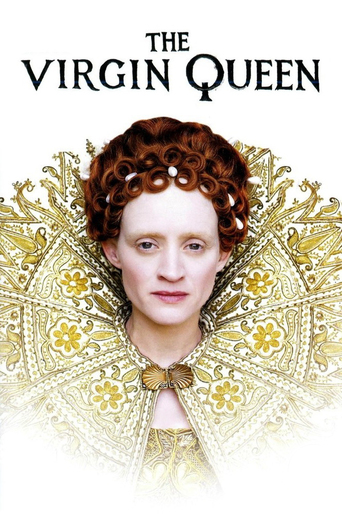patlightfoot
Well given the historical format and context, it was almost spot on, not like others and I thought acting was excellent. I preferred it to Elizabeth, and Elizabeth the Golden Age, as they were exploiting a very interesting part of English history, particularly the Tudor Period. And got it all wrong.My only comment is that sometimes true history doesn't actually make a good fiction film unless enhanced with fiction. Dudley Elizabeth's love of her life was NOT actually portrayed during/after Tilbury properly, he went on to govern her forces in the Netherlands for some years. And he did die with her knowledge he was dieing, as she sent him medicine. The Earl of Essex, well Errol Flynn was a better actor in looks admittedly, but again, he was portrayed or characterized less romantically than in other films, that I feel was justified.But I as a student of this period feel it was OK, dragged a bit sometimes but I would recommend it to a history student, that I wouldn't with others who have tried to make a saga out of Elizabeth 1. Hated Golden Age although cinematography was very nice. But this TV mini series and Elizabeth as portrayed by the actress given this part was very good. Possibly Glenda Jackson did as good a job too.
benbrae76
What would film and TV companies do for historical dramas if Elizabeth I had never reigned? If they run out of ideas (or Dickens novels) it seems that somebody comes out with a brand new concept. "Hey! what about giving old Lizzie another run for her money? Nobody's done it for at least 6 months!" This 2005 mini-series although having authentic costumes, delivers nothing that hasn't been told (more accurately and better) a hundred times before in novels, biographies, operas, dramas, documentaries and even historical pageants.In this latest effort it seems that a lot of pieces from the jigsaw that was Elizabeth's life have been lost, and the bits that remain have been haphazardly bunched together to create some sort of patchy biography. Consequently there's very little flow to the production as a whole, with just a scant look into the inner character of the "virgin queen" in particular. As for Ann-Marie Duff's speech prior to the Armada battle, I'm afraid she didn't inspire me one iota, (even though she looked a very young 55 yrs as Elizabeth was at the time), and neither did the rest of her somewhat insipid performance. The real Elizabeth needed to be, and was, made of sterner stuff.Overall the sketchy script is equally uninspired, and is only adequately performed, however if one can watch it without being too critical of historical mistakes, it is in parts enjoyable...that is if you're an ardent Gloriana fan. This production falls far short of the wonderful Glenda Jackson's "Elizabeth R", albeit even that series now looks a little stagy and dated.I really do think it's time to give "Good Queen Bess" a miss...at least for another six months, maybe even a year. The poor old dear must be completely worn out watching down from high, at all these seemingly endless reproductions of her life. Then in the meantime someone could just come up with a bright new idea. Another Dickens perhaps?
barnet55-1
I was really looking forward to this as Elizabeth is my favourite historical personage. However it's turned out to be a festival of historical inaccuracies, anachronisms and above all, poor casting.The death of Mary Tudor didn't take place as was depicted, and in episode one Chancellor Gardiner was shown announcing Mary's death to Elizabeth in 1558, but Gardiner died three years before that in 1555. In the second episode Elizabeth used the quote "To err is human, to forgive, divine", which was written by Alexander Pope over 100 years after Elizabeth's death! Anne-Marie Duff, fine actress though she is, hasn't the fire and authority to play Elizabeth as she should be played. Sam Hardy is too wimpish for Dudley, which needs an actor with a commanding presence to play him. Jeremy Irons was just right for the part in the Channel 4 production "Elizabeth I" last year. Ian Hart is too young for Cecil, and Dexter Fletcher, who normally plays "cheeky Cockney" type roles, isn't right in the part of the Duke of Sussex either. The scenes after Elizabeth's coronation were conducted in a room which was Jacobean, and the Victorian standing candelabra at the side of the throne were an anachronism. The stakes which the Protestant bishops Latimer and Ridley were tied to were nicely finished instead of being just a plain tree trunk as they would have been in reality - surely Mary's government would have thought that a bit of a waste when all they're going to do is get burnt? And to cap it all, they were burned in their best frilly nightshirts!Lazy research by the writer, anachronistic quotes which seem to have escaped the script editor and lines no self respecting actor should have allowed to pass their lips have all combined to make The Virgin Queen a very poor example of a historical drama, which the BBC usually do so well (Charles II was excellent). Call me picky, call me pedantic, but if you're going to make a drama on one of the most famous women who ever lived, for god's sake get it RIGHT!
mama-sylvia
The authors disagree with most conventional histories of Elizabeth in small but significant elements. The most important was their portrayal of Amy Dudley's death as a suicide, since the cloud her death left over Robert Dudley affected his relationship with Elizabeth for the rest of his life. They portray Lettice Devereaux as a scheming vixen, Mary of Scotland as being framed for conspiracy against Elizabeth, the Earl of Essex as a manic-depressive, and portray Elizabeth as seriously intending marriage when most evidence shows she was shrewdly playing suitors against each other to benefit England. On the other hand, many of the intriguing and baffling elements of her reign are accurately presented, including her intelligence, her scheming to survive her sister Bloody Mary's reign, her vanity, her tendency to blind partiality towards her favorites, and the astonishingly poor military ability of those favorites. Rather engaging story and will hold the interest of those not familiar with Tudor England, but seriously disappointing to those of us who think the story supported by historical documentation is enthralling enough.













